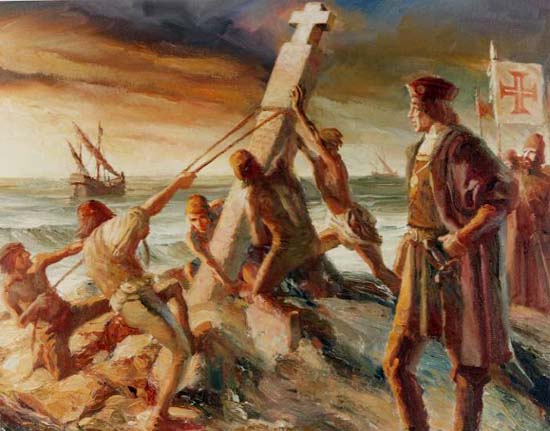
|
PADRÃO
|
|
O esforço
é grande e o homem é pequeno
Eu,
Diogo Cão, navegador, deixei
este
padrão ao pé do areal moreno
e para
deante naveguei.
A alma
é divina e a obra é imperfeita.
Este
padrão signala ao vento e aos céus
Que,
da obra ousada, é minha a parte feita:
O por
fazer é só com Deus.
E ao
immenso e possível oceano
Ensinam
estas quinas, que aqui vês,
Que
o mar com fim será grego ou romano:
O mar
sem fim é portuguez.
E a
Cruz ao alto diz que o que me há na alma
E faz
a febre em mim de navegar
Só encontrará
de Deus na eterna calma
O porto
sempre por achar.
|
|
Comentários: Este é outro dos poemas mais conhecidos de Mensagem e tal como os seus pares (Infante, Mar Português, e Mostrengo) a linguagem é clara e quase não requer explicações. "o mar com fim..."- o Mediterrâneo; "o mar sem fim..."- o Oceano. "o que me há na alma (...) só encontrará, de Deus na eterna calma, o porto sempre por achar"- irei sempre mais longe porque, por mais longe que vá, haverá sempre um porto por descobrir; só descansarei (só encontrarei esse porto) depois de morrer. palavras mantidas em ortografia antiga: deante= diante; signala= sinala (assinala); immenso= imenso; portuguez= português.
|
|
An introduction to the poem: The early discoverers used to mark newly found lands with a wooden cross. King John II ordered those markers to be made of stone, for greater durability. A typical "padrao" was a stone pillar topped by a cross beneath which was engraved the Portuguese coat-of-arms. Some of these stone markers lay unnoticed by all until rediscovered in the late XIX century, some 400 years after they were erected and are a moving memento to those who left them to signal "to the wind and the skies" that the caravels of King John II had reached those distant strands. Padrao The
task is great and man is small.
I, Diogo Cão, navigator, have left
This padrao by the sandy shore
And onwards set my course.
The soul is divine and the work is imperfect.
To the wind and the skies this stone signals
That, of the daring deed, mine is what is done:
What is left to do, is God's will.
And to the vast and possible ocean
Tell these escutcheons you see
That the bounded sea may be Greek or Roman:
The sea without bounds is Portuguese.
And the Cross on high says that what goes in my soul,
And causes in me the urge to sail forth,
Will only find in God's eternal calmness
That port forever unfound.
|